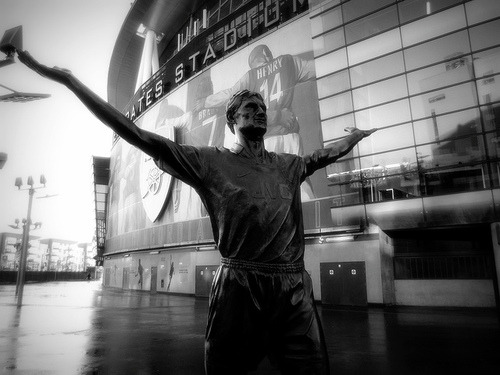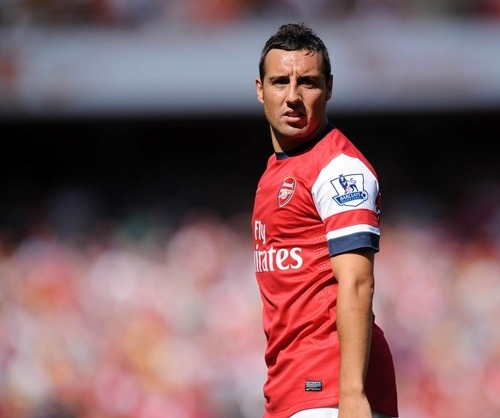Arsenal As Gatsby: At War with the Ideal?
Arsenal As Gatsby: At War with the Ideal?


By Jordan Brown
“The truth was that Jay Gatsby, of West Egg, Long Island, sprang from his Platonic conception of himself. He was a son of God—a phrase which, if it means anything, means just that—and he must be about His Father’s business, the service of a vast, vulgar, and meretricious beauty.”
-F. Scott Fitzgerald ‘The Great Gatsby’
Success, as it relates to the individual, is a dangerous thing to define. At the cooling of the earth, there were no natural yardsticks lying about, no perfectly formed lists on cave walls to prescribe purpose. And so we are all born with the precarious task of deciding exactly what acts and accomplishments will imbue us with worth—which feats once realized will allow us to rest in the peaceful sleep of fulfillment. It is difficult enough to do personally, but collectively—in the guise of competition—the problem becomes even more harrowing. Club football is a never ending chase for success, continuously repeated, where even the most glorious victories at the end of one season are put aside just months later—the points set back to zero, the calendar reset, and the expectations reaffirmed. Arsenal Football Club are in the midst of grappling with this question of success, trapped like Jay Gatsby in a prison of platonic ideal.
Much like the 1920’s of Fitzgerald’s novel, the current state of European football is one of unprecedented materialism fuelled by the chase for ever growing profits. This summer encapsulated the situation nicely. English clubs went flying towards Asia and North America, chasing tastier slices of the market share, PSG announced itself as the newest of the nouveau riche with their expansive layout for Lavezzi, Thiago Silva, and Zlatan Ibrahimovic. And finally, closer to the home of this issue, the summer’s longest transfer drama was the chase for Arsenal’s Captain, Robin Van Persie. Eventually leaving for a large increase in salary offered by Manchester United. Days later, Alex Song signs for Barcelona. Two years has seen two captains and two prominent midfielders leave for confines new.

To pile even more angst onto the club and supporters, the home opener found the team struggling for a goal against Sunderland. Barring a standout performance from Santi Cazorla, Arsenal were stifled. The match commentary and postgame coverage all tread heavily with similar lines. They’re missing Van Persie already. One might wonder if a certain Dutchman would have put away that Giroud chance. Struggling already, what will this mean for Wenger? If they struggle to find goals like this, what does this mean for the season?
The media do their job well, tossing layer upon layer of meaning onto a solitary event, attempting to make what is perceptively small into something metaphorically large.
This is a danger for the club and it’s supporters. With the uneasy summer and an already ubiquitous narrative of X trophyless seasons met with X transfer spending and X more important players out the door, the two groups are more susceptible than ever to distress. All of the doubts, lined up and paraded on a daily basis through blogs, sports pages, and call-in shows have manifested into a genuine existential crisis—a struggle between reality and ideal.
Not so long ago, in a relative sense, Arsenal Football Club were in a state of perfection. The season of The Invincibles was a psychological peak for the team, and it is—problematically—an event burned into the mind of every Arsenal supporter. Few enough teams can claim to have claimed the winner’s trophy of the English Premier League, a drastically fewer amount can claim to have done it without defeat.
The past has become the ghost with which the club continues to fight. It stands at the start of every season, and at the doorstep of the Emirates Stadium itself—immortalized in the low gleam of solid bronze is Thierry Henry in the midst of his sliding celebration, his face frozen in primal shout. Henry is not alone, in front of the North Bank stand is Tony Adams, striding triumphantly—arms out in perfect cruciform.
The past two summer transfer sagas were, at their heart, about the struggle of the traditional ideal against the current. Throughout both Fabregas and Van Persie’s summer dramas surfaced the question of loyalty. Arsenal had ‘given’ so much to these players, they had wardened their talent and nurtured them through injuries and slumps, eventually making them both captains. They had kissed the badge and hugged the gaffer. And so it was they were lured by the sirens of glamour and money, the current villains of the game. The choice to Arsenal fans was on one side history and loyalty, and the other cynicism and greed. The clubs on offer being grim totems of our game’s degradation, whereas Arsenal represented a purer way—their manager, his tactics, the club, and it’s financial ethos.
I won’t suggest that celebrating the past and is meaningless. On the contrary, our history informs us. It’s record is a tool for observation and growth. The celebration of past glories, for the pride they have earned is useful as reminder—tangible evidence of our capabilities. What cannot be forgotten though is the fluidity of time. When the past ceases to inform and instead serves to fetishize, it warps our expectations. No one wins every day. No one has a divine right to the throne. That is the beauty of football, its cyclical nature which continuously crowns new champions who last only as long as they are able.
In Fitzgerald’s novel, Gatsby falls for his ideals and his dreams, they destroy him. He was also right. In the novel’s world of post-war disillusionment and the hollowness of the wealthy, Gatsby the Dreamer is the only sympathetic character. Arsenal are the same, Wenger possibly more so. Seemingly under constant siege both within and without, attempting in the conflicting era of recession and profit to uphold a club’s ethos, faceted by all parts of its organization in the face of assault by the media, its peers, and its own support. It is wholly admirable, and that is where the club and its fans should draw strength. The game is cyclical, the snake devours itself, the rich find new toys, and no one loses forever. That is the principle the statues in front of the Emirates are there to enforce. “Tomorrow we will run faster, stretch out our arms farther…and one fine morning—”
This was written by Jordan Brown, a senior writer at AFR. You can follow him on Twitter at @JordanSig. Comments below please.







